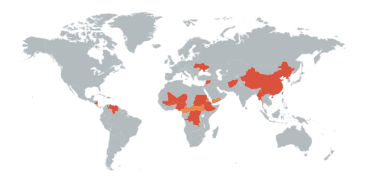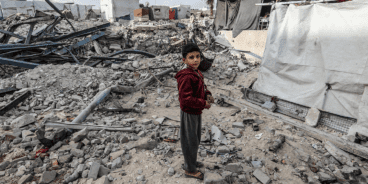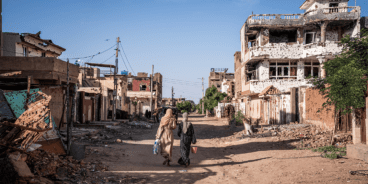
Atrocity Alert No. 145: Afghanistan, Sudan and Israel and the Occupied Palestinian Territories
Atrocity Alert is a weekly publication by the Global Centre for the Responsibility to Protect highlighting situations where populations are at risk of, or are enduring, mass atrocity crimes.
UN says record number of civilians were killed in Afghanistan during 2018
On 23 February the UN Assistance Mission in Afghanistan (UNAMA) and the Office of the UN High Commissioner for Human Rights released their annual report on the protection of civilians in Afghanistan. During 2018 the UN recorded 10,993 civilian casualties as a result of the ongoing armed conflict in the country. Among the casualties were 3,804 civilians who were killed, including 927 children, marking an 11 percent increase over 2017 and the highest annual number of civilian and child deaths in the past decade.
Nearly two thirds of the casualties were caused by armed extremist groups, including the Taliban and the so-called Islamic State of Iraq and the Levant-Khorasan (ISIL-K), while the Afghan military and pro-government international forces were responsible for one quarter of the casualties. The increase in civilian deaths was mainly attributed to a rise in the use of improvised explosive devices (IEDs) in civilian-populated areas by anti-government armed groups. As noted in the report, “indiscriminate and disproportionate IED attacks are serious violations of international law that may amount to war crimes.” ISIL-K has also targeted the Shia religious minority in systematic attacks that may constitute crimes against humanity.
Meanwhile, the United States and the Taliban have reportedly made significant progress in peace talks being convened in Qatar, including discussing a framework to facilitate the withdrawal of all international military forces from Afghanistan. However, the talks have been criticized for their lack of inclusivity, with the Afghan government, representatives of women’s groups, and ethnic and religious minorities all excluded from the negotiations.
According to UNAMA, more than 32,000 civilians have been killed in Afghanistan over the last decade. It is essential that all parties to the conflict cease indiscriminate attacks on civilian-populated areas and conduct all military operations in strict adherence with international human rights and humanitarian law. While the Doha peace talks present an opportunity to negotiate an end to the current armed conflict, any lasting peace will require the involvement of representatives of the vulnerable civilian populations who have borne the brunt of the war and are targets for ongoing persecution by armed extremist groups – especially women and religious and ethnic minorities.
Sudan: Mass protests continue despite state of emergency
After almost three months of mass protests, on 22 February President Omar al-Bashir declared a state of emergency in Sudan. The emergency measures include a ban on demonstrations, the establishment of emergency courts, the dissolution of the central and state governments, and the appointment of military officers to government positions. During an address in Khartoum President Bashir said that the demands of the people for better living conditions were legitimate, but warned against further protests.
The emergency measures were imposed in an attempt to curb mass anti-government demonstrations that have taken place since 19 December. The violent crackdown by the security forces on peaceful protesters has resulted in at least 50 people being killed and thousands arrested and detained. President Bashir also announced the delegation of his powers as leader of the National Congress Party to Ahmad Harun, the former governor of the disputed state of South Kordofan. Harun and President Bashir are both wanted by the International Criminal Court for alleged atrocity crimes committed in Darfur.
On Thursday, 28 February, thousands of protesters participated in marches against the state of emergency and demanded that President Bashir resign. International observers have also spoken out against the measures, including the European Union High Representative for Foreign Affairs and Security Policy, Ms. Federica Mogherini, who said that they “create a permissive climate for the security services to act with impunity against peaceful protesters.” In a joint statement on 26 February, the Troika countries (United States, United Kingdom and Norway) and Canada emphasized that the measures “will further erode human rights, governance and effective economic management.”
The declaration of a state of emergency and the appointment of a fugitive from international justice as leader of the ruling party indicate that there is a considerable threat of a further escalation of violence. Now is the time for the international community – especially those states with influence in Khartoum – to impress upon the government of Sudan that it must immediately end the use of disproportionate and deadly force against peaceful protesters and rescind the state of emergency.
Israeli forces committed possible war crimes and crimes against humanity during 2018 Gaza protests
On 28 February the Human Rights Council-mandated Commission of Inquiry (CoI) on the protests in the Occupied Palestinian Territories (OPT) submitted its report on the 2018 demonstrations in the Gaza Strip. The CoI found evidence that the Israeli Security Forces (ISF) killed 183 Palestinians, including 35 children, with live ammunition and that military snipers shot more than 6,000 unarmed demonstrators between 30 March and 31 December 2018. According to the CoI, during the protests Israeli soldiers committed violations of international human rights and humanitarian law, some of which may constitute war crimes or crimes against humanity. The government of Israel has rejected the report as “hostile, false and biased.”
The violations occurred in the context of the ISF’s response to mass protests, referred to as the “Great March of Return and the Breaking of the Siege,” organized along the Gaza border. The demonstrations were initially organized in the lead up to the 70th anniversary of the founding of Israel and the Palestinian “Nakba” (Catastrophe) on 14 and 15 May, respectively. While the CoI concluded that some Palestinians perpetrated “acts of significant violence” and that Hamas, the de facto authority in Gaza, failed to prevent the “use of indiscriminate incendiary kites and balloons” directed at Israeli territory, the ISF’s response “killed and injured civilians who were neither directly participating in hostilities, nor posing an imminent threat.”
As the one-year anniversary of the start of the Gaza border protests approaches, the Israeli authorities should thoroughly investigate the ISF’s response and hold all perpetrators of potential crimes against humanity and war crimes accountable. Both Israel and the Palestinian Authority should also cooperate fully with the preliminary examination of the International Criminal Court.
Related Publications


Atrocity Alert No. 419: Israel and the Occupied Palestinian Territory, Global Landmine Report and Crimes Against Humanity Treaty
